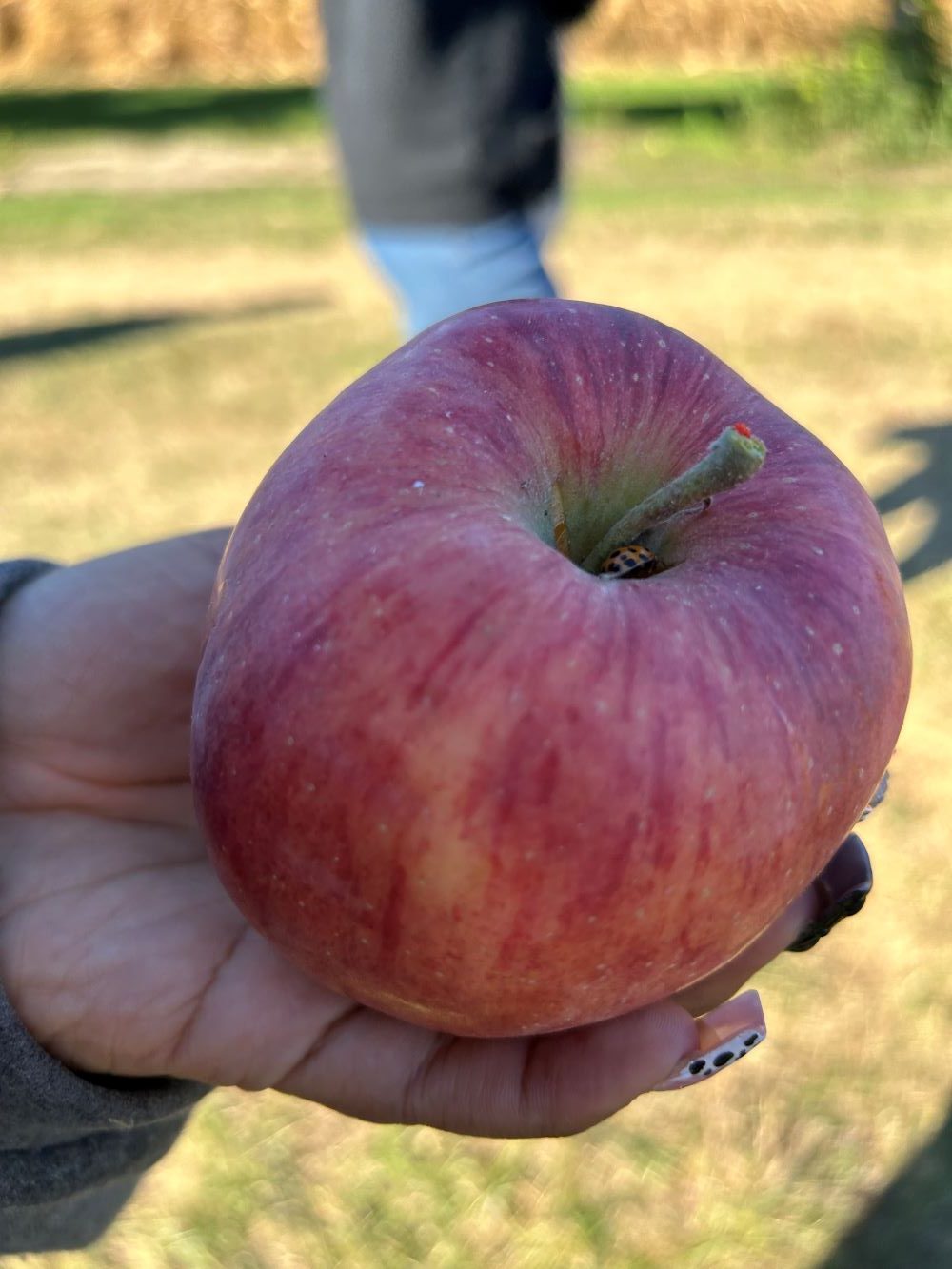It’s one of those autumn afternoons in Michigan when October holds its breath as the brilliance reaches its fleeting peak. Bent branches drop flecked apples to the earth while leaves of every hue languish in the soft wind, dying as we all should – naturally, gently, gracefully. In the distance, I hear the laughter of ninth graders trying to find one another in the labyrinth of a corn maze. Three hawks circle overhead. The sun is piercing and unrelenting.
This is a moment so full and bittersweet that the task of holding it all feels impossible.
Three weeks earlier, I was in Palestine. Today, I am here picking apples with students . . . but I am also there. In Palestine. The juxtaposition is too much. My heart and stomach and mind are unable to catch up to the words people are asking me to speak. Sometimes language simply hits a wall. So much beauty and so much horror vying for space in the same human heart. The heart is expansive, but how much can it really hold?
It had been 19 years since I was last in Palestine. As I stand between rows of bent Midwest apple trees, I recall the first time I saw bulldozers ripping ancient olive trees from their roots outside a small village in the West Bank. Instinctively, I fell to my knees. It felt as if I had been stabbed by a spear of molten steel, and I wanted to throw up. Things were bad when I was there in 2004 and 2005, but now the situation is exponentially worse.
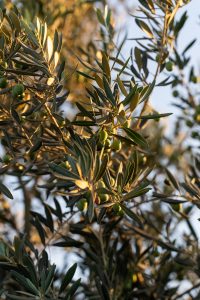
Photo by Will Allen-DuPraw
In late August, I was part of an interfaith solidarity delegation to Palestine led by Sabeel Ecumenical Liberation Theology Center and organized by Rabbis for Ceasefire and Christians for Ceasefire. While the U.S. – funded genocide in Gaza rages on day after hellish day, the situation in the West Bank has deteriorated to an alarming degree. The gloves are off and any semblance of restraint has vanished. This is truly a revelatory, apocalyptic moment. A moment when all illusions have been crushed, and the mask has been ripped off, much as it has been here in the U.S. Yes, this is who we are.
During times such as these, there is a temptation to bury ourselves in the world of ideas, exercising what I would call intellectual bypass. I go there often. My home is filled with shelves of books on the history and politics of Palestine. Over the past two decades, I have attended and organized countless talks, seminars, and conferences. While scholarship and social analysis are crucial, they are not enough. Similarly, it is easy to slip into spiritual bypass, retreating into an abstract world of imagined purity that places us above the fray in an effort to absolve ourselves from the material reality of complicity. The truth is that we have blood on our hands – thick, sticky, red blood that we cannot read or pray away.
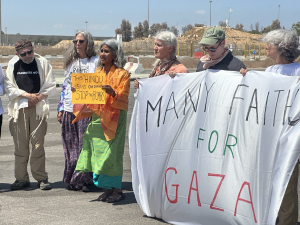
Photo by Will Allen-DuPraw
The biggest delusion is believing there is a way to circumvent the reality, the truth, the horror by leading disembodied, dissociated lives during this time of genocide and ethnic cleansing. We cannot escape our enfleshed, sensory selves.
Picking apples with these young poets, on a day so perfect it hurts, brings me back to my body. Back to Palestine. The sound of apples falling into white plastic buckets collapses into the sound of the bombing we heard at the Kerem Shalom border crossing into Gaza. To know that on the other side of the wall behind us children are being killed with my tax dollars is a terrible reality that is lodged deep within my bones. It burns and will never leave. On our way to the border, we could see smoke plumes curling above the Gaza sky and fell silent.
This is perhaps why each time I have returned from Palestine, I go mute and find it almost impossible to share what cannot find its way into words. This is because Palestine is not an idea, an issue, an abstraction.
Palestine is hot sweet tea served in small glass cups near an olive grove where the trees have names. It’s eating bread fresh from an old taboun. It’s the dark beauty of the Old City and the spunk of Ramallah. It’s staying with a warm Bedouin family in a cave south of Al-Khalil.
It’s gathering under a perfect April night sky in Bil’in for a meal prepared by the village, tables collapsing under the weight of hummus and lamb and rice and bread. And the body knows in some ancestral, ancient way that this unlikely banquet attended by Palestinians, Israeli anarchists, and sundry internationals is how the world is supposed to be.
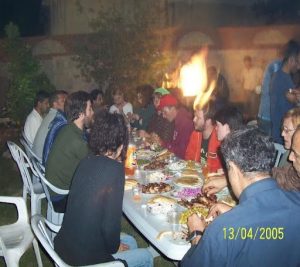
And just like the searing ache I’m feeling on this perfect autumn day with these beloved students, my body knew at that moment in a very deep and visceral way that Palestine will one day be free, that Beloved Community is on its way, and that this is what the Universe wills for humanity.
And just as everyone was drinking coffee and singing and laughing and leaning back smoking hookah, hearts froze and stomachs tightened as Army Jeeps roared over the hill en route to a home in the village to arrest a child for allegedly throwing a stone at a soldier during a demonstration earlier in the day.
While I listen to the giggling of our students who covertly throw a few apples at one another, my body is back in Palestine listening to the sizzling whoosh of tear gas canisters, the screams and broken glass after a soldier lobs a percussion grenade at the family serving us tea, settlers banging on metal doors in the Old City of Hebron in the middle of the night, the barking dogs in the distance. The pounding heart and churning stomach and cloddish feet waiting for the unexpected to occur. This never knowing what’s coming next is a terror tactic – an occupation of the body that never leaves. Palestinians live with this all day, every day.
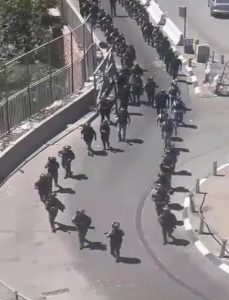
This time, I return from Palestine with grief in my guts so deep I often find it hard to eat. Anger locked in tense muscles. I have given several talks since we’ve been back that cover the many details of what our group saw and heard and the actions we took, but it has been hard to be linear, logical, coherent. Instead, the deeper truths of our time in Palestine shows up in my body, sometimes my dreams, in concrete images that meld past and present, here and there.
One moment I’m awestruck by hawks circling above kids in a corn maze, and the next moment I am thinking about the drones hovering above the heads of children in Gaza and Jenin.
Maybe time and space are only constructs we have created to make sense of the incomprehensible. It seems that the things that really matter have a way of collapsing into one another, of coalescing, of melding in a felt manner that defies articulation.
The rage I felt when I saw a settler casually dump out a bucket of water while washing his car only yards away from the Bedouin community of Umm-Al Khair reignited the rage I felt during the Detroit water shutoffs. Umm al-Khair is frequently attacked by encroaching settlers who have restricted the community’s water access to seven hours a week as a way of driving the community off their land. I met Khalid and his three-year-old daughter there, a beautiful child with faraway eyes. He told me that a year ago she was attacked by a settler’s dog and had to receive psychiatric care in Hebron and that she refuses to leave his side.
In the Jordan Valley, settlers are staking Israeli flags into the ground to claim land that isn’t theirs, and the Arabic names that appear on road signs have been spray painted over in the same hue of blue Homrich used when it marked the homes of those whose water it had shut off. The families in the Jordan Valley are being attacked almost nightly and many have left.
This time around there was a tense feeling of foreboding in the West Bank. Much of the Old City was eerily quiet, Bethlehem was vacant, checkpoints were empty since the hordes of Palestinian men who used to be caged in narrow, cramped lanes on their way to work are no longer employed.
While we were there, there were raids, and incursions, and drone attacks. Human rights groups that were once demonized are now criminalized. UNRWA (United Nations Relief and Works Agency for Palestine Refugees in the Near East), which since 1949 has provided educational, health, and social services to Palestinians, has been outlawed and deemed a terrorist entity by Israel’s Knesset.
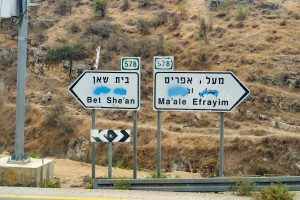
The exhausted faces of human rights workers, dust mixed with the debris of a demolished home in Silwan, a distraught mother from Birzeit whose young daughter was dragged from her bed at gunpoint and is being held in administrative detention without charges, the countless bullet holes in the UNRWA school in the Shu’fat refugee camp, the procession down a dusty road to the nonviolence resistance camp organized by a family fighting for their land in Al-Makhrour, marchers sitting down in the road in front of a line of soldiers blocking the family from reaching their home, the bowl of thick red paint into which we dipped our hands in preparation for an action at the U.S. Embassy.
Blood as red as apples in autumn.
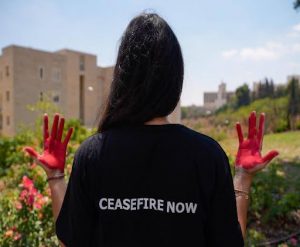
Photo by William Allen-DuPraw
The erasure, the displacement, the incursions, the degradations and humiliations, the ethnic cleansing, the environmental destruction, the genocide. Just witnessing this for the duration of a short trip takes a toll, imagine living with this for over seventy years. Storing all of this in the bones and muscles and sinews and cells of bodies that just want to be free to live and dance and plant and create.
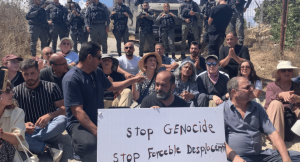
At one point, I take a break and step into the corn maze myself – lost, confused, walking in circles with absolutely no idea where I’m going. The crunch of stiff, golden leaves underfoot grounds me. The rattle of corn stalks waving in the wind – like old women raising their arms in a song of lamentation. Old ones who have the courage and wisdom to weep and moan and wail. To curse and kick and keen. To open themselves to feelings that live in a land beyond language. To remain embodied.
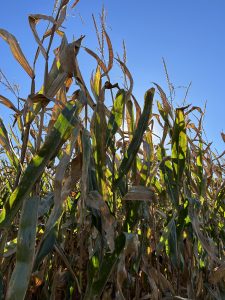
Retreating into bypass strategies to avoid reality is not an option. Doing so only feeds denial and delays healing, if such is even possible. It may be better to simply let it all in and work from our wounds.
I am there in Palestine, but I am also here in an apple orchard with young people who themselves are carrying a lot. Knowing the deadly consequences of expansionist projects on this continent, they understand things at a very deep level.
Soon, we will be building an ofrenda at our school to honor our dead, knowing that there is no ofrenda big enough to hold all the grief of Gaza.
I pray for a heart big enough to hold all of this. May I let go of any tendency to run from reality or retreat from the bodily demands of this moment. May I fall, like a graceful autumn leaf, into the work that is mine to do.
Kim Redigan is trying to live a surrendered life in service to the children of our world and the planet, especially Sister Water. She is a nonviolence trainer who has served on many domestic and international peace teams and human rights delegations. She is a teacher, mom, and campus minister at a high school in Southwest Detroit.

